Lelystad Airport, the most sustainable airport in the Netherlands
Lelystad Airport aims to be the most sustainable and innovative airport in the Netherlands. We invest in sustainable technologies such as LED lighting on the runway, an energy-efficient terminal with solar panels, and electric flying.
Our collaboration with partners like EBS for electric bus transport and initiatives such as the Flevoland Hydrogen Valley project contribute to a more sustainable aviation sector and region. Discover how we are working together with our partners towards the future for aviation.
Navigate to
LED lighting on runway and taxiway
In 2018, Lelystad Airport has been fully equipped with CEDD AGL technology by THK Airport Solutions. To prepare the airport for commercial traffic, the runway was extended and air traffic control as well as an instrument landing system were introduced. The airfield ground lighting on the runway, taxiways and apron areas were upgraded with CEDD airfield ground lighting technology.
The fast response times of the CEDD technology, with feedback within 500 ms, make the airport operations faster and safer than with traditional airfield lighting technology. Furthermore, due to the lack of transformers and connectors, the technology is far more resistant against water ingress in pits and conduits.
Learn more about airfield products of THK Airport Solutions.
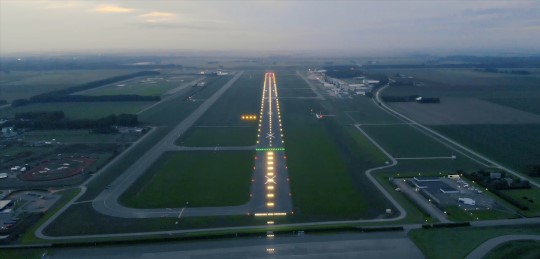
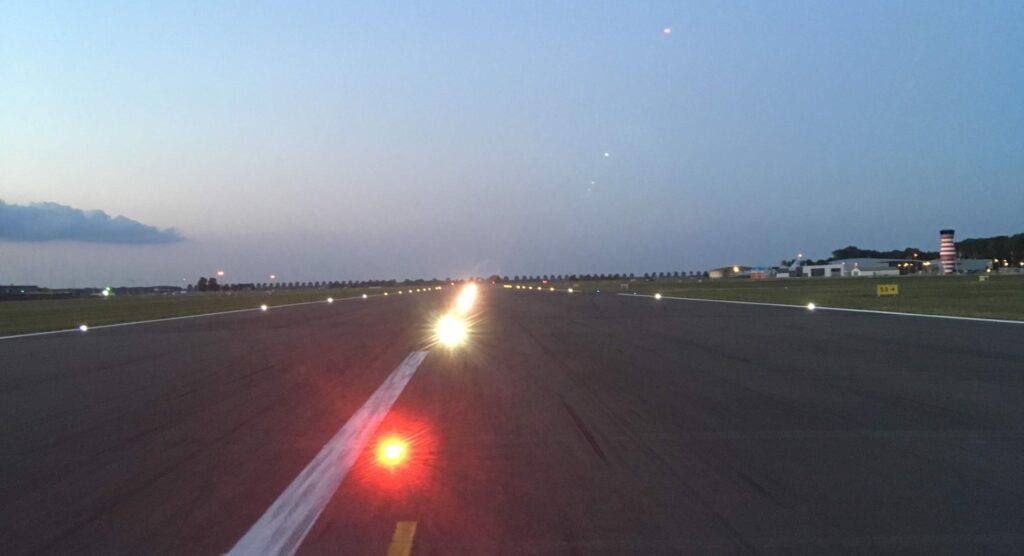
Fieldlab ROC training with electric aircraft
MBO College Airport Hoofddorp is part of ROC van Amsterdam | Flevoland and has a field lab at Lelystad Airport focused on sustainable aviation. Students work with a fully electric aircraft, the Pipistrel.
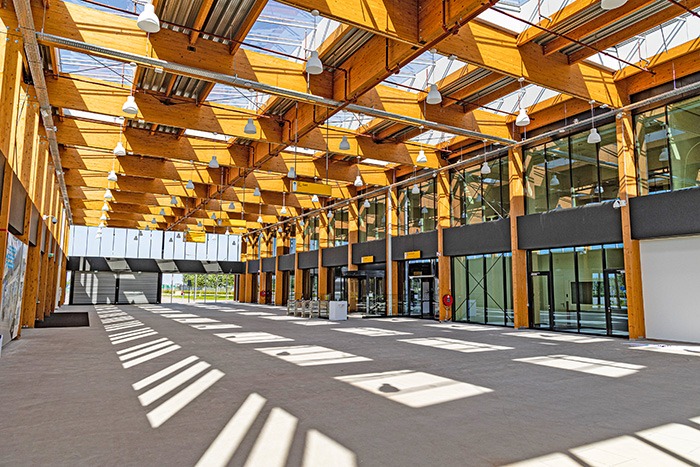
Passenger terminal is one of the most sustainable in the world
In 2019, the passenger terminal obtained the LEED Gold-certification, making the building measurably one of the most sustainable terminals in the world. Efforts have been made to minimise energy consumption.
Spaces where travellers spend only a short time, such as the entrance hall and reclaim, are not air-conditioned. The climate control system is switched on only at security, in the lounge and the waiting area at the gate. An air source heat pump is installed for cooling and heating. The terminal has no gas connection. The building is well insulated, which further reduces energy consumption.

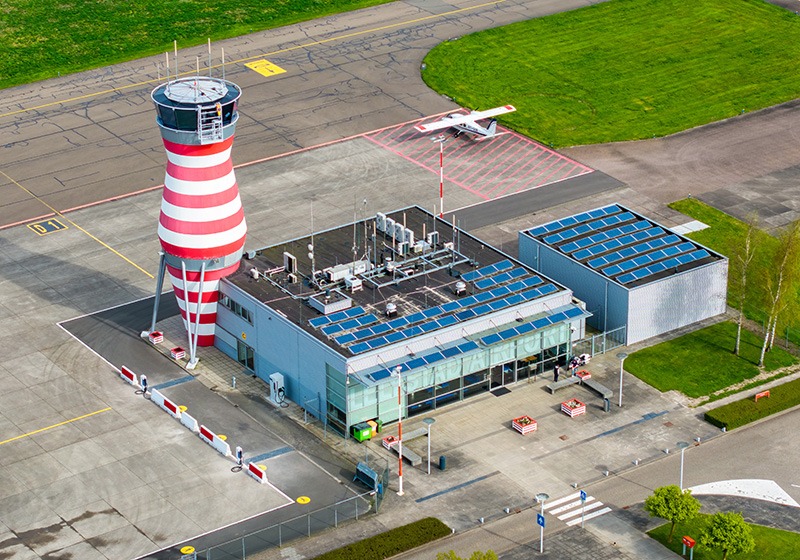
Solar energy from own site
There are solar panels on the buildings at Lelystad Airport. They fit our ambition to generate sustainable energy on our own site. More and more will be added in the coming years. This makes the solar panels a good addition to wind and ground energy.
The General Aviation terminal has a PV installation of 90 solar panels and the passenger terminal has 72 solar panels.
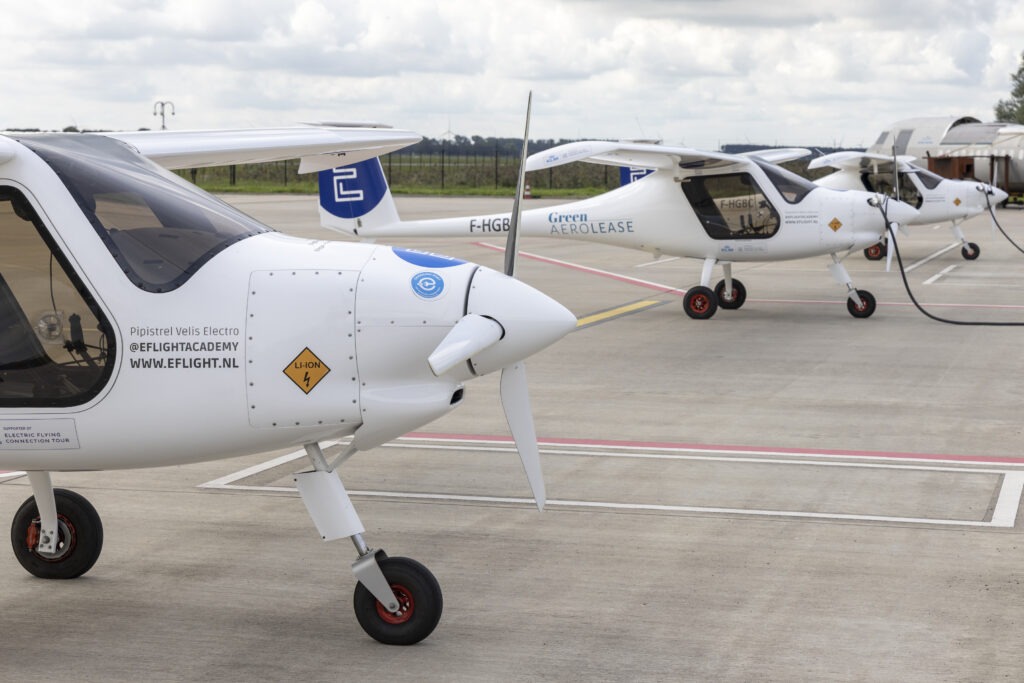
Electric flying between Lelystad Airport and Schiphol Airport
In the summer of 2023, 18 individuals had the opportunity to fly from Lelystad Airport to Schiphol in a Pipistrel Velis Electro with an instructor from E-Flight Academy. This initiative was a collaboration between Electric Flying Connection (EFC) and E-flight Academy with KLM as a partner.
The goal was to explore what electric flying means for logistics and the required infrastructure. Lelystad Airport’s central location, accessibility, and high-quality electrical infrastructure played a significant role in this event.
With this exciting event, Lelystad Airport contributed to insights into the electrical infrastructure and recharging of electric aircraft, which is necessary for electric aviation. To further advance aviation sustainability, all stakeholders in the industry must experiment with new technologies and innovations in practice.
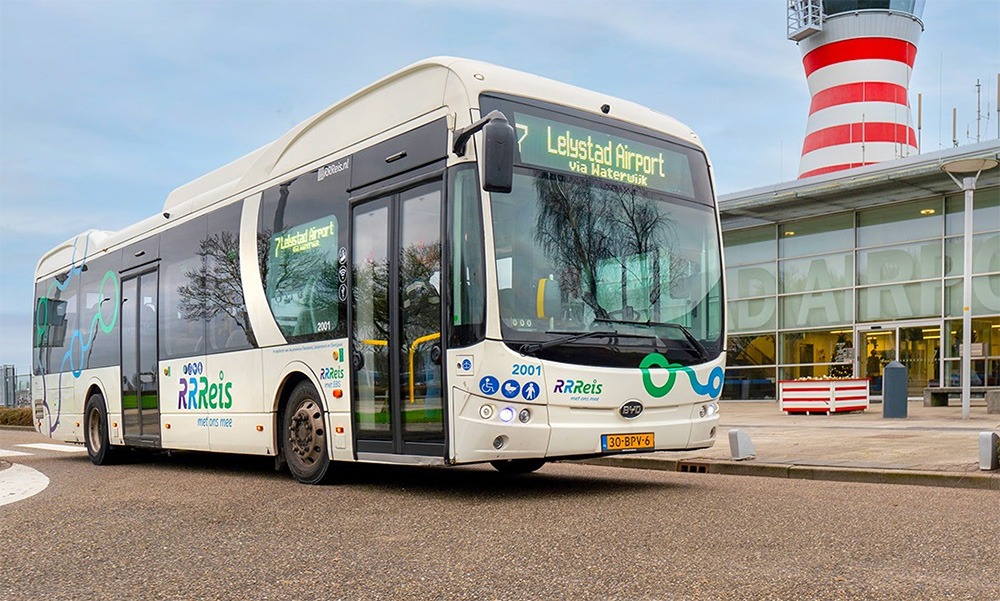
EBS bus transport to start electric charging at Lelystad Airport
Lelystad Airport has signed a lease agreement with the public transport company EBS for a newly constructed charging station for 28 electric buses. This will allow EBS to commence electric bus transportation in and around Lelystad starting from December 10, 2023, replacing the current diesel buses.
EBS and Lelystad Airport entered this partnership because EBS couldn’t find a suitable location for its charging station due to capacity constraints on the energy grid. Therefore, Lelystad Airport is willing to provide a portion of its capacity to enable electric bus transportation in the region in a timely manner.
EBS is currently in the process of installing the charging station near the new passenger terminal.
This collaboration contributes to the region and province’s interests and aligns perfectly with Lelystad Airport’s sustainability strategy. The contracting authority, Provincie Flevoland, EBS, and Lelystad Airport are pleased with this sustainable partnership and look forward to EBS’s electric buses hitting the road on schedule.
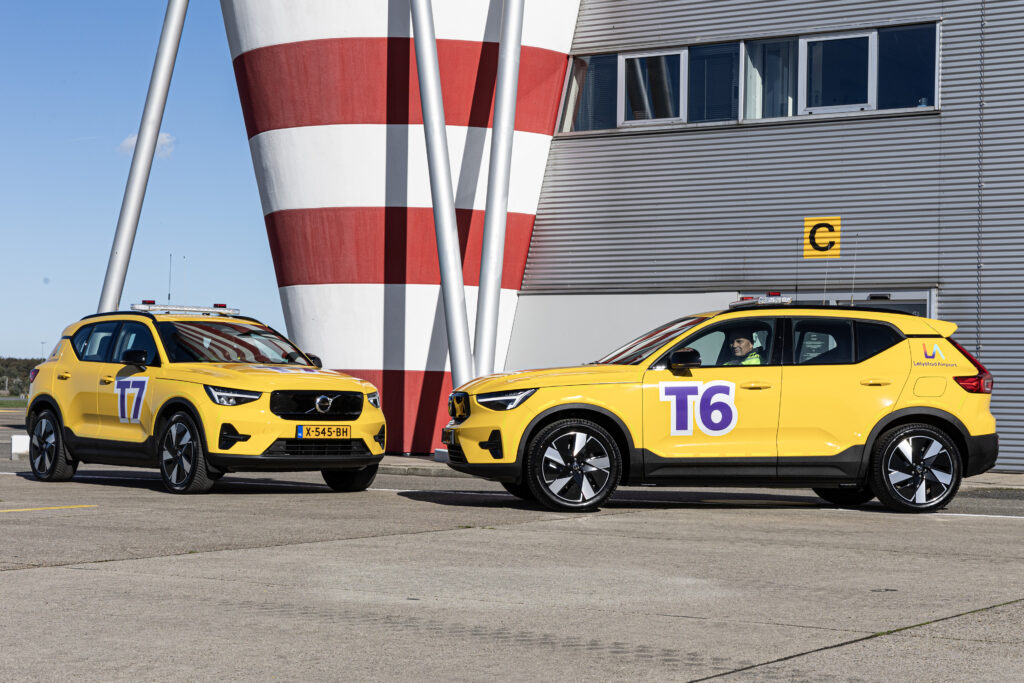
New fleet of electric vehicles for operational service
The daily operational service at the airport is carried out almost entirely electrically. The new fleet of electric cars makes the airport even more efficient and sustainable.
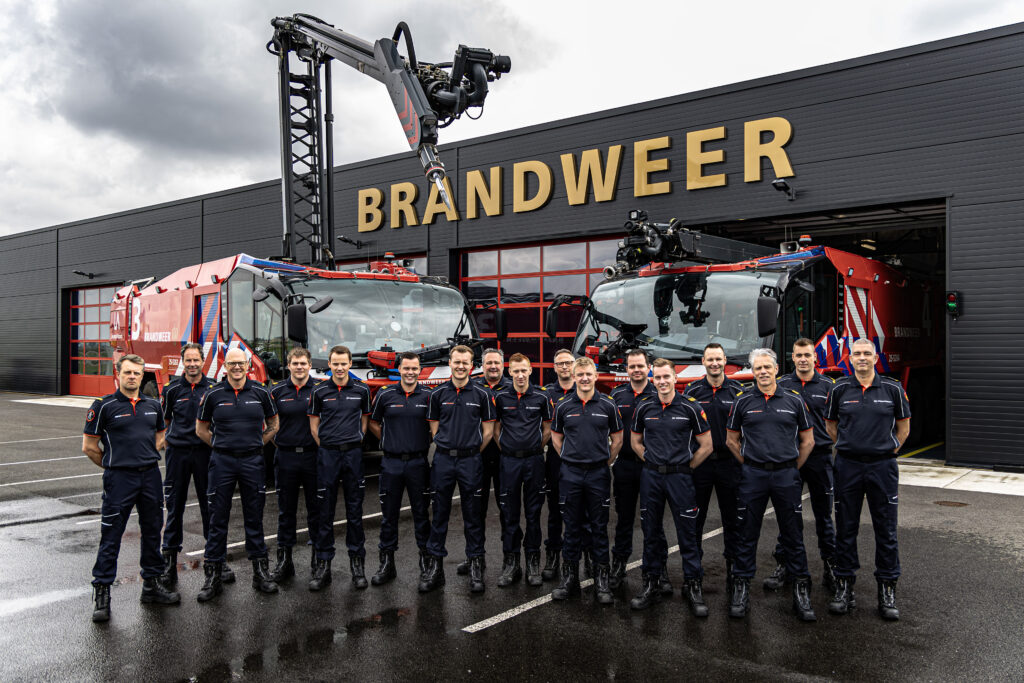
Crash tenders fire brigade on bio-fuel HVO-100
To reduce emissions from the crash tenders at Lelystad Airport, the fire trucks are fueled with the biofuel HVO-100. This helps us reduce CO2 emissions by 89% compared to regular diesel. The abbreviation HVO stands for ‘Hydrotreated Vegetable Oil.’ HVO is produced from waste, residual oils, and fats, in addition to vegetable oils, such as used cooking oil.

Flevoland Hydrogen Valley (FLHY) platform
FLHY was launched in June 2023 with the aim to jointly grow and prosper the hydrogen economy in Flevoland. Connecting suppliers and buyers of hydrogen will create new business and reduce the use of fossil fuels in Flevoland.
After the summer of 2023, Horizon Flevoland will organise cluster tables for groups of companies to jointly set up innovation projects around the theme of hydrogen.
Flevoland has little energy-using industry, but Flevoland does have Lelystad Airport, many agricultural vehicles that could run on hydrogen, several transport companies, ships and a large power plant: the Maxima power plant in Lelystad. The Maxima power plant is currently being converted to also run on hydrogen. There are many windmills and solar panels in the polder whose power can be used to produce hydrogen at suitable times.
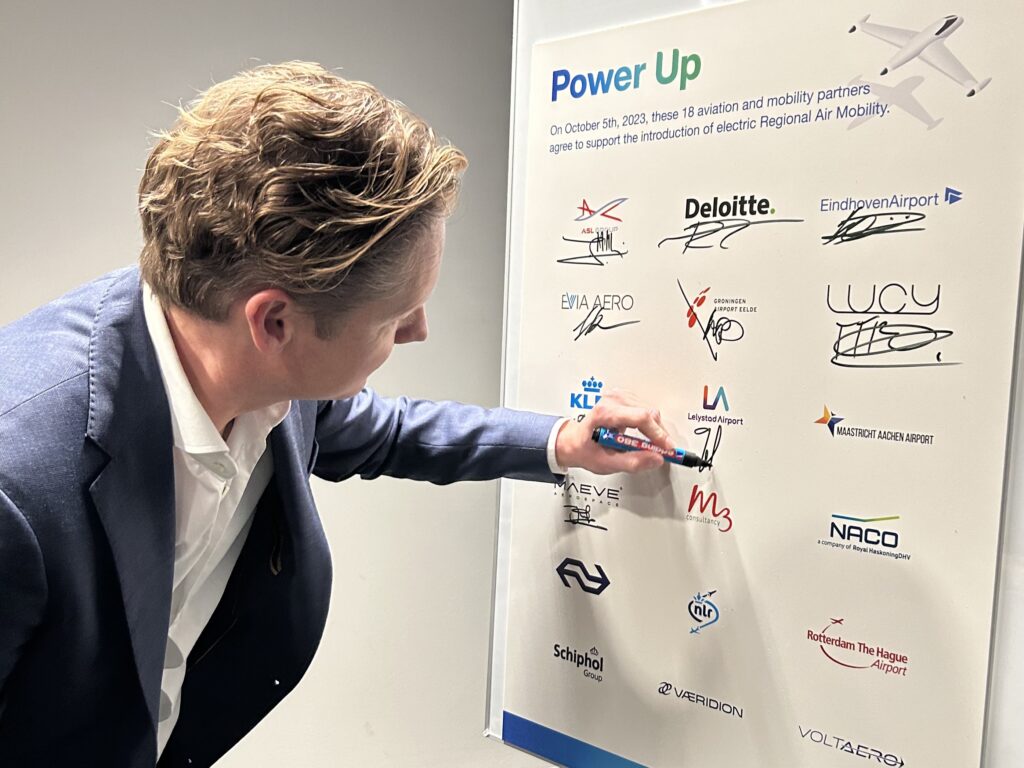
Power Up – 18 aviation and mobility parties support the introduction of electric regional aviation!
A consortium of 18 aviation and mobility organizations, working together under the name Power Up, have committed to supporting a new initiative for efficient, low-CO2, and convenient travel between and to regional airports. By signing a Memorandum of Understanding, Eindhoven Airport, Groningen Airport Eelde, Lelystad Airport, Maastricht Aachen Airport, Rotterdam The Hague Airport, Royal Schiphol Group, along with the ASL Group, LUCY, KLM, Evia Aero, Maeve, Vaeridion, VoltAero, the Dutch Railways (Nederlandse Spoorwegen), Deloitte, M3 Consultancy, NACO, and Royal NLR have agreed to collectively pave the way for the introduction of electric regional aviation.
The partners aim to develop passenger processes and align operational airport procedures together. Regional airports involved in Power Up strive to be operationally ready by 2026, having jointly developed a passenger-friendly product with partners, enabling the organization of the first electric commercial passenger flights thereafter.
Electric regional aviation (eRAM) entails the operation of commercial passenger flights by aircraft with 9 to 50 seats, powered by electric motors driven by batteries, hybrid-electric, or hydrogen-electric propulsion systems, covering distances from 150 to 750 km.
